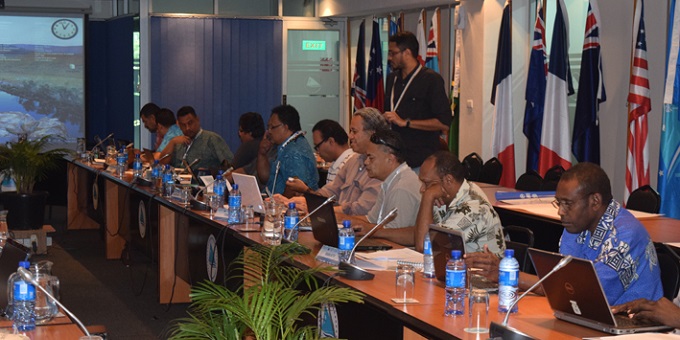Pacific Island countries need strong legislation and legal frameworks to regulate the import, distribution and management of chemical pesticides. Additionally, a harmonised regional pesticide registration system is being advocated. These were two of the issues discussed at a regional workshop to review the management of pesticides in the Pacific region. The workshop, held 10–12 September 2014, at the Secretariat of the Pacific Community (SPC) Regional Office in Suva, Fiji, brought together key regional and national stakeholders to promote working together and increasing the capacity to implement the objectives of multilateral environmental agreements (MEAs) for sustainable agriculture.
The UN Food and Agriculture Organization (FAO), in collaboration with SPC Land Resources Division, organised the workshop, and attended by delegates from 12 Pacific Island countries and territories: Cook Islands, Federated States of Micronesia, Fiji, Marshall Islands, Niue, Palau, Samoa, Solomon Islands, Tonga, Vanuatu, Kiribati and Papua New Guinea.
Dr Viliami Fakava of FAO sub-regional office in Samoa, welcomed workshop delegates, expressing appreciation to delegates for taking the time to attend the consultation on the critical issue of pesticides management..
Workshop coordinator and FAO Pests and Pesticides Officer, Dr Francesca Mancini, in her keynote address, said that FAO received financial support from the European Commission to strengthen the implementation of the principal MEAs, namely the Rotterdam and Stockholm Conventions, and others, such as the FAO/WHO Code of Conduct on Pesticide Management and the Convention on Biological Diversity. The funds are channelled through the MEA's capacity-building project which began in 2009 and is now in its second phase. Phase 1 – on the clean-up of obsolete pesticides – has been completed. Phase 2 includes five more countries and was approved in May 2013 for implementation.
In the Pacific, the programme will emphasise strengthening regional and national institutional capacity to regulate and monitor the use of pesticides in agricultural production and to minimise their use, using ecosystem services and biodiversity management.
'The use of pesticides in the Pacific Islands is on a rise, with farmers mostly using pesticides that are based on old pesticide chemistry. Pesticides are poorly managed from their point of entry into the country to their end of life. The vast majority of farmers lack access to and knowledge of the minimum risk management requirements.
'Pesticide externalities on human health and the environment can place a heavy financial burden on national economies and society in general. As a result, the importance of responsible pesticide management is now widely recognised by governments, industry, civil society and farmers.
'Important efforts have been made in recent years to improve the management of pesticides. In the Pacific, FAO has found two strong partners in the Secretariat of the Pacific Community and the Secretariat of the Pacific Regional Environment Programme to address the disposal of obsolete pesticide stocks, assess contaminated sites and promote alternatives to chemical use such as integrated pest management. '
The Secretariat of the Pacific Regional Environment Programme (SPREP), the Samoa-based environment organisation will have oversight to develop the container management system as part of the project.
Acting Director of the Land Resources Division, Dr Ken Cokanasiga, in welcoming delegates to SPC, pointed out the successful partnerships fostered by SPC with the international donor community in leveraging funds and technical assistance to help improve the livelihoods of Pacific Islanders. He said SPC's goal is to assist the Pacific Community to improve food, nutritional and income security, as well as sustainable management and development of land, agriculture and forestry resources. He said the proper legislation needs to be in place to regulate the import, resale and disposal of pesticides to protect the food we eat and safeguard our environment.
Gerold Wyrwal of FAO introduced the Rotterdam Convention, 'The Rotterdam Convention is a tool to support pesticide and chemical management. It is one of the key MEAs on the management of hazardous chemicals and pesticides. This meeting is convened as a consultation with countries that have ratified the convention as well as those that have not. It will provide an opportunity for countries to share their experience in ratifying and implementing the convention and to set the stage for further cooperation and collaboration.' The Rotterdam Convention on the Prior Informed Consent Procedure for Certain Hazardous Chemicals in International Trade entered into force in February 2004.
Mr Fereti Atumurirava, SPC Integrated Pest Management Officer, said thus far only four Pacific Island countries have ratified the Rotterdam Convention: Cook Islands, Samoa, Tonga, and Marshall Islands; New Zealand and Australia have ratified the convention as well. He said a harmonised and centralised registration system for pesticides will help Pacific Island countries have a better handle on the management of hazardous pesticides, with impacts on human health and the environment.
At the end of the workshop, a work plan and a regional implementation strategy delineating the roles and responsibilities of the regional organisations (SPREP and SPC), national counterparts and FAO, was developed for project implementation.
For more information, please contact Emil Adams ( This email address is being protected from spambots. You need JavaScript enabled to view it. or This email address is being protected from spambots. You need JavaScript enabled to view it. )





CONNECT WITH US